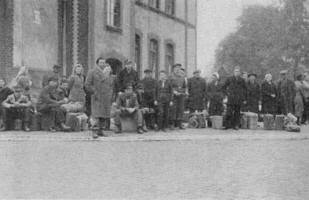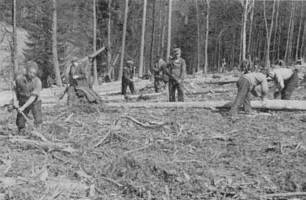|
This
part of the repatriation program was entirely in the hands of the military
forces. UNRRA confined its activity principally to setting up assembly
centers and helping to look after the people till transportation could
be arranged for them. By October practically all of the Western European
D.P.s had returned home or were at least out of Germany.
The
Western Europeans that continued to remain in Germany, though, were
mostly the ones who remained on the farms. Large numbers of foreign
workers had been assigned to farm-work. On some of the smaller farms
they lived right with the German farmer and some of them became regarded
as members of the family. The tie was strengthened as word was received
that the husband or son or father had been killed in battle. With Germany's
male population decreasing rapidly, it was only natural that the women
should be looking around for husbands.
Many
a DP or prisoner of war married a young widow or some farmer's daughter
whose sweetheart had been killed in battle. More than fifteen thousand
French farm workers alone are reported to have married German women
and elected to stay in Germany.
By
the summer of 1946, the Poles were still not going home fast enough.
A plan was devised that bribed them to return to their home. "Everyone
volunteering to return home would receive not only a complete set of
clothing of kinds, but would also receive a sixty-day food ration as
well." This produced some results for a while but not nearly to the
extent that repatriation officials expected.

To induce
Polish DP's to go home, they were given 60days'
rations and a completely set of new clothing
Source:
The Inside Story of UNRRA, An Experience in Internationalism. A First
Hand Report On The Displaced People of Europe - Marvin Klemme |

